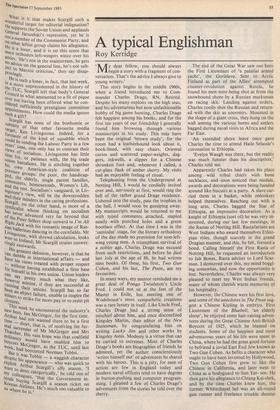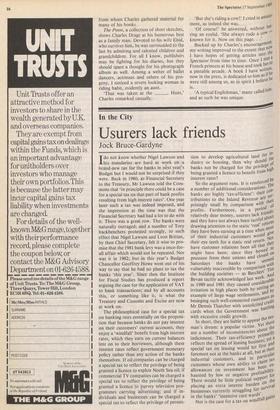A typical Englishman
Roy Kerridge
'My dear fellow, you should always begin a story with a fragment of con- versation. That's the advice I always give to young writers.'
This story begins in the middle 1960s, when a friend introduced me to Com- mander Charles Drage, RN, Retired. Despite his many exploits on the high seas, and his adventurous but now unfashionable hobby of big game hunting, Charles Drage felt happiest among his books, and for the first ten years of our friendship I generally found him browsing through various manuscripts in his study. This may have ' been the original 'brown study', for the room had a leatherbound look about it, book-lined, with easy chairs, Oriental curios and scattered paper-weights, dag- gers, inkwells, a slipper for a Chinese shrunken foot and, whenever I called, a cut-glass flask of amber sherry. My visits had an enjoyable feeling of ritual.
Telephoning from the Underground at Notting Hill, I would be cordially invited over and, nervously at first, would ring the bell of the rather grand Drage residence. Ushered into the study, past the trophies in the hall, I would soon be gossiping away. My manuscripts would be returned to me with typed comments attached, stapled neatly with punched holes and a green bootlace effect. At that time I was in the `samizdat' stage, for the literary orthodoxy of the day made no provision for non-left- wing young men. A triumphant survival of a nobler age, Charles Drage was excused from such restrictions, and before he died last July at the age of 86, he had written nine books. Of these, his first, Two Gun Cohen, and his last, The Poon, are my favourites.
In many ways, my mentor reminded me a great deal of Pongo Twistleton's Uncle Fred. I could not sit at the feet of the Master in Exile, but meeting one of Wodehouse's most sympathetic creations was a rare luxury in itself. Like Uncle Fred, Charles Drage had a strong sense of mischief about him, and once discomfited Kingsley Martin, then editor of the New Statesman, by congratulating him on writing Lucky Jim and other works by Kingsley Amis. Modesty is a virtue that can be carried to extremes. Most of Charles Drage's books are biographies of friends he admired, yet the author conscientiously 'writes himself out' of adventures he shared with his heroes. This is a pity, for men of action are few in England today and modern naval officers tend to have degrees in button-pushing and computer program- ming. I gleaned a few of Charles Drage's adventures from the stories he told over the sherry. The end of the Great War saw our hero the First Lieutenant of 'a palatial armed yacht', the Gorislava. Sent to Arctic Finland as part of the Allies' attempted counter-revolution against Russia, he found his men were being shot at from the snowbound shore by a Russian marksman on racing skis. Landing against orders, Charles coolly shot the Russian and return- ed with the skis as souvenirs. Mounted in the shape of a giant cross, they hung on the wall among the various horns and antlers bagged during naval visits to Africa and the Far East.
An extended shore leave once gave Charles the time to attend Haile Selassie's coronation in Ethiopia.
'Evelyn Waugh was there, but the reality was much funnier than his description,' Charles told me.
Apparently Charles had taken his place among wild tribal chiefs with bone necklaces, and soon noticed that medals, awards and decorations were being handed around like biscuits at a party. A slave car- ried them in a basket, while onlookers helped themselves. Reaching out with a long arm, Charles bagged the Star of Ethiopia, an impressive decoration. As a knight of Ethiopia (sort of) he was very in- terested, during our last few meetings, in the Rastas of Notting Hill. Rastafarians are West Indians who award themselves Ethio- pian titles, though scarcely in the grand Dragian manner, and this, he felt, formed a bond. Calling himself the First Rasta of Notting Hill, he requested an introduction to Jah Bones, Rasta adviser to Lord Scar- man. I demurred over this, my mind boggl- ing somewhat, and now the opportunity is lost. Nevertheless, Charles was always very pleased to meet my West Indian friends, many of whom cherish warm memories of his hospitality.
However, the Chinese were his first love, and some of the anecdotes in The Poon sug- gest a Chinese Kipling in embryo. First Lieutenant of the Bluebell, 'an elderly sloop', he enjoyed some hair-raising adven- tures during the Great Chinese Anti-British Boycott of 1925, which he blamed on students. Some of the happiest and most adventurous years of his life were spent in
China, where he had the great good fortune to befriend a jovial East End Jew known as Two Gun Cohen. As befits a character who ought to have been invented by Hollywood, Two Gun Cohen first grew to like the Chinese in California, and later went to China as a bodyguard to Sun Yat- sen. He then gave his allegiance to Chiang Kai-shek, and by the time Charles knew him, the former Whitechapel lad was an all-round gun runner and freelance trouble shooter from whom Charles gathered material fqr many of his books.
The Pooh, a collection of short sketches, shows Charles Drage at his humorous best as a family man. Devoted to his wife Enid, who survives him, he was surrounded to the last by admiring and talented children and grandchildren. For all I know, publishers may be fighting for his diaries, but they should spare a thought for his photograph album as well. Among a welter of ballet dancers, actresses and others of his pro- geny, I noticed a severe looking woman in riding habit, evidently an aunt.
'That was taken at the Hunt,' Charles remarked casually. 'But she's riding a cow!' I cried in amaze. ment, as indeed she was. 'Of course!' he answered, without bat- ting an eyelid. 'She always rode a OW — known for it. Now on this page. .
Bucked up by Charles's encouragernen" my writing improved to the extent that now I have hopes of getting articles into the Spectator from time to time. Once I Met 9 French princess at his house and took her to a pintable arcade. A book I have written, now in the press, is dedicated to him as if lie were still among us, as in spirit I believe lie is. 'A typical Englishman,' many called binli and as such he was unique.







































 Previous page
Previous page